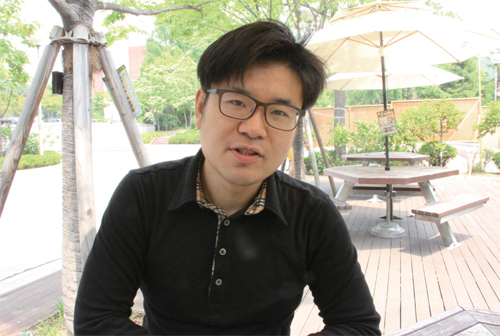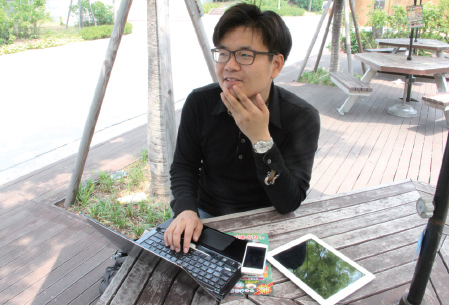

I started learning about computers from childhood. My father bought me a computer in 1992. He said the time would come soon when everyone owns and uses a computer. He also bought me some books about the programming language so that I could study it. When I was in middle school, I entered the Informatics Olympiad. I had a dream of entering a department associated with computers, but I went to a foreign language high school so I could not take science lessons.
Every night, I studied math and science so I could apply for a College of Engineering. However my grades were not high enough to send in an application. I had to study one more year to enter university, then I finally got into Dept. of Science in Taxation UOS.

After entering university, my hobby was still computer programming. I was interested in making my own website and running it. Thus I received an offer to manage Gwangjang. I have had this role since 2009, and it became my only hobby during my university life. Since I wanted to add more various online services for students’ convenience to Gwangjang, I studied more about the programming language. Some students would post their opinions on the short comings of Gwangjang. People around me also would propose some improvements to the features of Gwangjang. Thus, I started to make them, one by one.
Most of my work is actually made for the sake of me. For instance, the former timetable program was halted during the 2013 spring semester. I immediately felt an inconvenience, so I began working on the UOSTABLE. Once I think my work satisfies a certain standard of quality, that is when I distribute it to students to use it. Some of my works have fallen into disuse simply because the students did not use them.


Some students get a job related to their major, while others do not. I simply belong to the latter. These students and I can put our majors to use in search of our genuine goal of life and put the strength we have developed during university life to work. I think it is important for both the former and the latter to work hard and achieve good results. If you have your own value in life, it does not matter whether you are the former or the latter case.
Sometimes I consult with professors about the connection between a major and a hobby. For example, in my case, if a programmer has knowledge of taxation, such programmer has an advantage. Such a programmer, however, is just a programmer and not a tax professional. He or she cannot make programs about taxation by oneself and should collaborate with a tax professional. His or her knowledge is helpful during the working process, but he or she is just a programmer. It is more helpful for a programmer to focus on programming. In that sense, although we live in the age of convergence, I think you should still make your own strength. It is not too late to connect your major with the strength you developed after choosing it. My strength is in program development. I wish to cooperate with tax professionals someday. Nevertheless, since that is something I can think about after finding a job, I would like to concentrate on just using my programming strength for the time being.

I think the beginning should be drastic. If you are not good at your major, you could take a class from another major or do some external activities. In my case, I took many major courses: School of Business Administration, School of Economics, Dept. of Urban Administration, School of Law and School of Computer Science. If you just waste your time, it will go by quickly. Wasting one semester will quickly lead you to wasting another. Then the time for graduation is soon upon you. If you make a decision, your view will open up and you can blaze a trail. Some people around me said that I do every job well except in taxation. Such words make me feel fearless to challenge myself in other fields.
People call this era “the age of convergence.” Thus, some universities actively encourage students to have diverse experiences. I wish UOS would also do the same. Many students think that there is a wall which has shut them out of other fields. As for me, this wall has blocked my athletic and artistic ways. Besides me, most students especially at UOS might think that they do not have any athletic or artistic gifts. However, I now regret that I did not take those classes related to athletics or arts. Athletic or artistic knowledge is also needed in this age of convergence. If you have a chance, try to learn about another field that you never had a chance to learn before.

I think most of UOS students are enthusiastic only about their own work. But there are few students who break the mold outside UOS. I have met several people from other universities as the manager of Gwangjang. These students who work on external activities like me have diverse majors at other universities. Only a few UOS students do such activities these days. For the last four or five years, I have envied the students of other universities for this reason. For instance, some clubs at other universities are laying plans for a new business and developing it as a real business by themselves. There is no such case of this at UOS, and students do not give weight to the convergence. There should be some brave students who break the mold at UOS.
After the interview was over, Shim expressed his feelings about job interview. He has attended UOS since 2006 and is due to graduate this semester. Although he is just one student of UOS, he has always been more devoted to UOS than any other students. When I asked him about leaving his role as the manager of Gwangjang, he answered that someone as good as him will take it over for him. Though Shim will leave UOS, his spirit will still remain on Gwangjang and many other services and programs he created for UOS students.
Ra Young-cheor Junior Reporter
fkdudcjf16@uos.ac.kr

